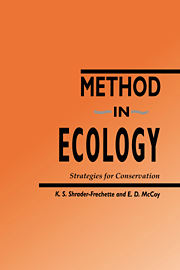Book contents
- Frontmatter
- Contents
- Acknowledgments
- 1 Introduction: What ecology can't do
- 2 Ecological concepts are problematic
- 3 Ecological theory is problematic
- 4 Ecological science is value laden
- 5 What ecology can do: The logic of case studies
- 6 Ecology and a new account of rationality
- 7 Objections to ethical rationality in ecology
- 8 A case study: The Florida panther
- 9 Policy aspects of the Florida-panther case
- 10 Conclusions
- References
- Name index
- Subject index
- Revisions (1993 printing)
9 - Policy aspects of the Florida-panther case
Published online by Cambridge University Press: 08 January 2010
- Frontmatter
- Contents
- Acknowledgments
- 1 Introduction: What ecology can't do
- 2 Ecological concepts are problematic
- 3 Ecological theory is problematic
- 4 Ecological science is value laden
- 5 What ecology can do: The logic of case studies
- 6 Ecology and a new account of rationality
- 7 Objections to ethical rationality in ecology
- 8 A case study: The Florida panther
- 9 Policy aspects of the Florida-panther case
- 10 Conclusions
- References
- Name index
- Subject index
- Revisions (1993 printing)
Summary
e. o. wilson (1988, p. 13) noted recently that the current rate of loss of species is between 1,000 and 10,000 times greater than it was before human intervention. If our conclusions in the case study in the previous chapter are correct, then although development pressures have threatened the Florida panther, it is not clear whether it is scientifically possible to specify the conditions that will guarantee the survival of the subspecies for at least 20 years. Hence, despite our efforts, the taxon could be yet another example of the losses chronicled by Wilson.
Because ecology is, in large part, an applied science, it is important not to end our investigation of the Florida panther with the scientific analysis in the last chapter. Like all applied scientists, ecologists need to give some thought to the possible policy consequences of their scientific conclusions. We have just argued, in the previous chapter, that it is uncertain whether it is scientifically possible to specify the conditions that will guarantee the survival of the Florida panther, in the wild, into the next century. Despite our scientific uncertainty, however, does it make sense – on ethical and policy grounds – to try to save the panther? This is the question we shall address in this chapter. We ask the question, not because panther preservation has high ecological priority but because it has strong popular support and because it can provide insights into using the method of case studies.
- Type
- Chapter
- Information
- Method in EcologyStrategies for Conservation, pp. 240 - 278Publisher: Cambridge University PressPrint publication year: 1993



